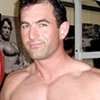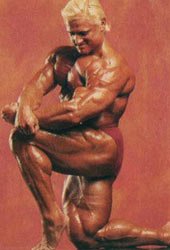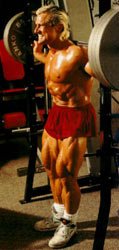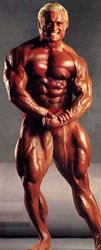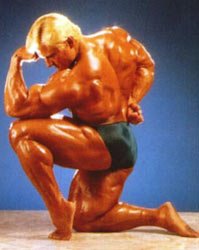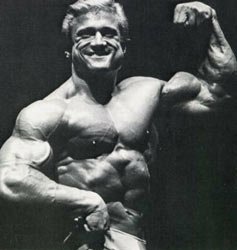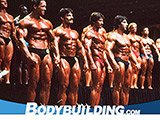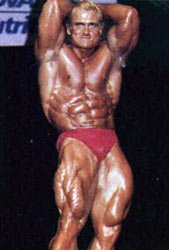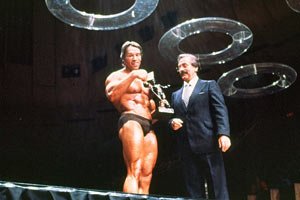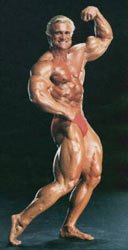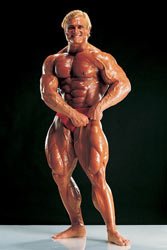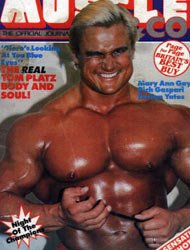| Part 1 | Part 2 |
Article Summary:
|
He has been referred to as bodybuilding's Golden Eagle and "the man with the legs", and has spent a good portion of his life weightlifting and working in the sports science field, but as you'll soon read, bodybuilding great Tom Platz is much more than a prominent international sporting figure and educator.
He is as well-rounded a representative of health, fitness and sporting success - and all of their individual facets - as you will find anywhere. And all of this originated from a love for bodybuilding.
As a child, Tom had a singular wish: to move to California and become a bodybuilding champion, just like men he had read about. Men like Dave Draper and Arnold Schwarzenegger. He did just that and became one of the best in the game, thus solidifying his own name as a bodybuilding legend.
As Tom evolved as a bodybuilder, as his mind expanded in line with his enormous quads, he developed a knack for proving the critics wrong and for his intelligent insights into a multitude of subjects from philosophy to the mechanics of strength training.
His positive attitude, humble outlook and brimming optimism enabled him to not only win several major bodybuilding contests, but to accept defeat like a man and to persevere against all odds. Needless to say, his transition from bodybuilder to educator and businessman was an easy one.
By 1981 Tom had reached a full ripped-to-shreds bodyweight of 230 pounds and was owner of the largest muscular legs in the world (appendages that would help make him a household name in the lifting community).
With leg development unrivalled, even to this day (it could be argued), Tom capitalized on his bodybuilding success and the uniqueness of his look to establish himself as an authority and expert - traits that earned him, at one point in his career, a lengthy professorship - on the science and business of bodybuilding.
With his solid business background, coupled with his knowledge base, Tom, upon retirement, began to travel the world preaching the health and fitness message using the beneficial bodybuilding practices of nutrition and advanced training, among many other things, as a basis for his legendary seminars.
| RELATED VIDEO | |||
|
He is now back in the bodybuilding fold with his involvement with PROPTA, which will be discussed more in interview two of this series.
I recently spoke to Tom and asked him to discuss his career, in particular his thoughts on his own development - physical and mental - and reputation, his contest history including the controversial 1980 and 1981 Mr. Olympia productions and his training mindset.
I also questioned Tom on his alleged return to the bodybuilding stage. Will Tom return? And just how big is he today? The speculation is now over. Read on to find out.

[ Q ] Hello Tom. It is a great pleasure to speak with you today. The first Muscle and Fitness Magazine I bought had a picture of you on the cover. What year did you retire from bodybuilding?
- Hi David. Good to speak with you too. I retired in 1986. That was the last real year of my retirement, after my last Olympia.

[ Q ] How old are you Tom? Still young enough for a bodybuilding comeback, fingers crossed for us fans?
- I'm 53. And seriously I have had many, many people and supplement companies contact me, all wanting to know if I would do an over-50 comeback. I was very serious and spent about a year thinking about it. I spoke about it with my wife: "Okay Honey how do you feel about me doing this, getting in shape again?" (Laughs).
I know what it takes and thought very seriously about it and was beginning to work towards doing that and that's when PROPTA (Pro-PTA Certification Organization) contacted me and I felt I could contribute my talents much more so and more officially in this capacity rather than making a comeback; because I have been there and done that.
| RELATED POLL | |||
|
|||

[ Q ] So a return to the stage is not on the immediate agenda you? 
- No, I don't really see that as the ideal thing to do, even if it was just exhibitions. I would rather fortify a
- ; fortify a
- or a
- .

[ Q ] Do you think your goals are more altruistic these days? As you get older do you increasingly feel that you would like to give more back? 
- I think you maybe start getting that way when you are over 50. You start thinking about what you can contribute and how you can contribute your talents. And that's where I come from.
Everything I learned in life came from the gym. How to set goals and go after them, how to make things happen even after everyone said you could not do something (laughs); I can remember before you were born, at the '76 Mr. America... I thought maybe I should quit. That lasted about five minutes. You keep moving forward; this is part of the curriculum and it's something I just love.

[ Q ] You've probably heard the speculation on the internet. Just how are you looking these days and are you still training hard in the gym?
- Well obviously I'm not the 240 pound bodybuilder people saw throughout my career - I was between 225 and 240 depending on my schedule. I'm not that weight right now. I could easily get back to over 200 and I did it in '95.
Every ten years you think about making a comeback and that's where I am now, but I decided to put my energies elsewhere. So I'm about 180 pounds right now. Compared to the '80s (Tom's prime) I'm extremely light now.
I realize that, but if I were - and I don't plan on it right now - to make a comeback, I mean 20 pounds would be like going to the gym and training hard. It comes back very quickly. I can remember back to the old days when you would walk into the gym lean and in a few months time you would have grown; you grow towards the event and that's the way I used to do it.

[ Q ] Hypothetically speaking, if you were to walk back into the gym tomorrow and begin training intensely, as any good bodybuilder should, then could you conceivably pack on 20 pounds of quality mass within, say, six months?
- Seven months. I have calculated this out already and in seven months I could get back into excellent condition where I could guest pose. I don't know about competing.
Honestly, bodybuilding competition is not like golf. With golf you can go back as a senior as long as you have the swing and the necessary developed motor pathways, and weight train. All of the old guys like Jack Nicklaus all weight train now - it is part of their protocol and brings back the muscle tissue.
| FORUM THREAD | |||
|
Started By: Shanecutler51 |
- They don't hit the ball as far as they used to when they were in their mid-30s. But when a normal guy comes back to the (bodybuilding) stage at over 50, the lower back does not look like it did in their 20s. It's harder because we have a very visual sport.

[ Q ] And a very critically judged sport. People - fans and judges - will often zero in on the smallest defect a competitor has. 
- I can remember back when I tore my biceps and everybody's eyes went to the torn biceps instead of my overall conditioning.

[ Q ] You were always known as the guy with the legs. But certainly, in my view at least, you were a very well balanced competitor with great back, chest, shoulders and abs development. Did it ever frustrate you that you were often singled out as being a competitor with one freaky body part?
- You know, it's a funny thing. First of all I'm honored to have been able to make a difference during my era, when I was competing as a pro. I'm honored and it is my pleasure to have received such a compliment, of course.
To be recognized for my legs; I tried to play them down when I was getting critiques from Weider and people back in the '80s. When I trained legs less they grew more; it was a form of periodization, of course.
By actually placing less emphasis on my legs in the '80s, even to the point where I would not train legs a month prior to an event, they got bigger, more detailed, sharper, saran wrapped looking; it was almost like steel cords were on there with cuts in them. Amazing stuff.
- There's a picture on the Internet now of
- and I looking in the mirror; it was taken when I came back from the European Tour and it's like I used to come home from a tour and look in the mirror and say, "My God, what's that muscle?"
It's an honor to be remembered in that capacity. I never did plan on it; usually you don't plan on those things. There were times when I didn't feel I had the appropriate balance, that my legs did receive the notoriety. It's funny when I walk down the beach with my wife and somebody yells out, "nice legs man," my wife says, "They're not talking to me honey." (Laughs).

[ Q ] This could be good or bad, context depending. Do you think that you were ever marked down because your legs were thought by the judges to be too large? Did the judges not consider your whole package because your legs took center stage?
- All of the above is possible; it is a matter of opinion who wins the events. And it is based upon a variety of things, as you know. Some of it's subjective and some of it's objective. But all the judges became my good friends.
I guest posed for all the Olympia judges many times around the world. After the '81 Olympia where Franco won and everyone thought I could have been one of the winners, along with Danny Padilla and Roy Calender, by losing that event, by losing it, I became more sought after than you could imagine.
Everybody wanted to see me onstage; they wanted to see the legs, hear the music. All the judges from the '81 Olympia had me to their countries a few times.
| RELATED VIDEO: TOM PLATZ POSING ROUTINE | |||
|
- I've always wanted the Mr. Olympia trophy. I had a trophy cabinet built for it. But I would never trade what I received and the friendships made and the response I got for losing, for winning the Olympia trophy. I wouldn't want to give up what I did get for the Mr. Olympia trophy.

[ Q ] Had you, however, won the Olympia title, might your career have gone even further?
- Hindsight is always 20/20. But if I had won, it would have been, "Well here is just another guy who won a major title in '81". There are a lot more people who are a lot more talented than me and they weren't publicized.
They were Mr. Olympia winners and they were good winners, but they didn't receive the notoriety and the career possibilities that I did from losing.

[ Q ] Your personality would clearly have played a role in your success also.
- It has to. In the '70s I was competing and I competed in my first Mr. America in '76. They used to actually interview the contestants.
The constants were expected to talk to the judges about world affairs and life. And they wanted to know if you were Mr. America and they would vote for you based on how you would handle yourself and represent the sport on TV. I would like to see it go back to that someday.

[ Q ] So might these qualities you discuss be, today, as important in the minds of the judges, as they were back in the '70s? Might a competitor's behavior and attitude affect his placements, even in today's judging climate, although they are not directly scored when a show is judged? 
- Your behaviors and attitudes are very important. And I learned what not to do. I'll give you a few instances. I learned that when you don't win you should not carry it with you; you should let it go. It is one man's opinion.
For instance, when Mentzer got into it with Arnold in 1980 in Australia, Mentzer became very bitter. He was a great champion; I learned a lot from Mike, he was a good friend and may he rest in peace. But that bitterness he carried with him certainly wasn't a healthy thing.
Ron Teufel, who I competed with in the '78 Mr. America in Cincinnati. Supposedly he was the guy who was supposed to win. He got very upset and walked off the stage angry. And who do you think they chose to go to the Mr. Universe? Me.
| RELATED ARTICLE | |
|
|
Author: Robert Nailon |
- Another thing I learned was that when you stand on the stage you have to accept the judges' decisions in a sportsmanlike way, for whatever reason. Okay, in '81 Franco won; I raised his hand and congratulated him. It's a matter of opinion who wins.

[ Q ] It does seem you have experienced your share of controversial decisions going against you. At the 1981 Mr. Olympia, in particular, a good case could be made for you winning this contest. It must anger you in some ways that the judging process sometimes does not seem fair - especially if you are on the receiving end of a bad call.
- Sure. Onstage I raised Franco's hand and I shook his hand and congratulated him. In the locker room: I punched a wall (laughs). I was upset, but when I was confronted with the media I thought about what was the right thing to do and I figured it was out of my hands.
I just think that Franco should have placed a little bit lower and I should have placed a little higher. And Franco's a great champion and I'm honored to be here today. This is what I would say.
It wasn't a diplomatic, political kind of statement I planned really. It just made sense to me. I felt that that was the right thing to do. And to tell you the truth, it worked out to where my career, it couldn't have been any fuller over the years. Bodybuilding has been very good to me over very many years, and it still is.

[ Q ] Not many competitors would accept such a decision, as was made at the 1981 Olympia, in such a manner. 
- At sporting events you often see people get angry. And I'm not different. It's just that after the '80 Olympia, where Arnold won, and there were people who didn't like that decision, I went to Arnold's office and said, "Hey, I'm in this business because of you. I moved out to California because you inspired me. I just want you to know where I stand."
I really wanted to be honest with him and I wanted everybody to know how I really felt. And you want to do well - everybody wants to do well - and it's pretty much a 'me' sport.
But, one of the things you realize when you get older Dave is that you can't do it alone. If it wasn't for Weider, the judges and those promoting the event, Jim Lorimer and all of those people, I wouldn't have a career. So, in other words, we are stronger in numbers and I was produced from an internal love and passion that I have for bodybuilding.
| RELATED WALLPAPER | |||
|

[ Q ] An Australian made documentary, The Comeback, had you saying before the 1980 Mr. Olympia that Arnold would win the show no question. Of course his win was a controversial one. Looking back, do you feel that Arnold's win was justified? 
- Arnold was very good. And it's hard. It's like Muhammad Ali getting back into the ring (when he was still in fighting shape): if you go back 20 years ago it would be hard for him to lose from the standpoint of how the judges felt about him.
It would be hard for Arnold to lose on a bodybuilding stage if he is in relatively good condition. Even though it is debatable, but decisions are always debatable. But it would be hard for him to lose because of what he had contributed to the sport so far, at that time. And I look at that and I sort of expected that and understood that.
Not that I was happy to not win myself. I realized that (the overall decision) and honored that and paid it forward. A lot of good things came from competing over the years. But like I said, I never won an Olympia. It would have been great to win. But I think a lot of it - how well you do - comes from the attitude you chose.

[ Q ] You were, as history has shown and proven, one of the most popular bodybuilders of all time, something that cannot be taken away. What other body parts of yours did you think were good? As we discussed you are often cited for your leg development. What else about your physique was impressive in your view? 
- When you are competing you are always thinking about getting better. You want to be better than yesterday, but worse than tomorrow. I look back now on pictures from years ago and I think, I guess I wasn't that bad (laughs). But when you are competing you are like, "I can always get better".
I felt my chest was in excellent condition. Back - certain parts of my back were very good. Calves and abs also were good. I think my weakest area, if I have to identify a weak area - and I probably will now, as it has been for 30 years - was probably arms. I had to really try hard and really develop a strategy for training arms. And they did get better over time, but they weren't Arnold arms. I rivaled Franco, I'll tell you that.

[ Q ] Was your arm development due to a genetic structural weakness or the injury you sustained?
- I'd say it was structural based upon
- . I did not come out of the womb with cross striations on my legs, for example. It came through a lot of hard work and a lot of
- . I was influenced by weightlifters back in the '70s and the squat rack almost became a separate sport for me.

[ Q ] Many people criticized Arnold's win at the 1980 Olympia, and continue to do so to this day. Is this due to the fact it was he that won this contest and that his high profile status magnifies any controversy involving him? 
- Sure. Arnold's a commodity, he's a name and it's hard for anybody in the public eye to not get criticized. Everybody will say something or have an opinion. Somebody said to me one time: "If you are out shooting turkeys in the woods, shoot the one with the longest neck."
The person who is the most popular in bodybuilding and other sports is going to have a lot of people looking at him to criticize. How you deal with that is what's important. I think any athlete and anybody in the public eye has a responsibility to function, and it's difficult sometimes because you want to lash out. And you get those who will see red and go after it.
In business and the politics of life I find my real strength and my power comes from hesitating before I react. It often doesn't work on the field, but it works in life. To be patient when you see red, and then respond. And Arnold has been faced with that for years of course because of what he has done and what he has accomplished.

[ Q ] So you would stand back and assess the situation before making a decision.
- Yes, but on the
- field, for example, you have to react immediately - in a fraction of a second - milliseconds. In life, rather than getting crazy and saying things you can't take back, think about it in terms of what would be the right thing to do.
And I was lucky; my training kicked in as far as my college years and my educational background, and with this my response to losing.
It's difficult to respond to losing. It's very difficult, as we all want to be winners. I am glad I made the decision I did all those years back. I still talk to Arnold and Franco. Franco is someone I have the utmost respect for and we see each other at different functions and we remember the old days.
| RELATED VIDEO: TOM PLATZ BARBELL SQUAT | |||
|

[ Q ] What would have been your greatest moment as a pro bodybuilder and why?
- Wow, there have been a lot of great moments. I would have to mention the
- and have to also mention the '86 Olympia. At the '86 Olympia I did not place that well - for my last year. It was due to a number of reasons but I was just off.
But the reception I received onstage; it was like a symbiotic response to where it was like everybody was onstage with me. And every move I made they were responding accordingly. I had five or six encores at this one event. And I wasn't guest posing mind you; I was competing.
That particular evening in 1986 was the most memorable, most moving experience I had on the Olympia stage, or any stage. I remember walking offstage after five or six encores and Arnold looked at me and it was like "What is happening Tom?" There is such a thing as non-verbal communication.
And that's what posing is: telling your story to the audience. And the audience was part of it; they knew I was going to retire afterwards.
They got it from my movement patterns, my gestures. And I was belting out poses - Bam. It was like belting a punching bag. They caught on to what it was, they got into the moment and they were living through me: we were all one at that point. Any performer, if you can experience that once in your lifetime then you are lucky.
I would give another 30 years for one more night like that. And I'm not talking about the money or the career, I'm talking about the feeling you get and that's why you go out on that stage. It's like a hunger being fulfilled.
| CLASSIC BODYBUILDING QUOTE | |
|

[ Q ] So, for you, it is all about the feeling of the moment. That is what drove you to be at your best.
- Oh yeah, and like I used to say, you have to be an actor, a diplomat, a businessman and an athlete to do this. All four functions have to come into play. This is from my analysis of
- and
- and
- and all those people.

[ Q ] At the 1986 Mr. Olympia you were, in a sense, signing off and paying your respects to the audience?
- Yes, and giving back what they gave me. It was the energy that the audience gave me all throughout those years. They gave it to me and I was throwing it back to them and saying, "Here you go."

[ Q ] And at this particular contest you posed to your signature song, Ride Like the Wind. How did this song become such a popular choice for you?
- It's funny but I became known for that song. It was sort of my theme song: Christopher Cross, Ride Like the Wind. I always used it regardless of what else I used.
In 1986 I used that music initially, as people expected. But I made a switch to Twist and Shout by The Beatles. And the audience didn't expect that: they went nuts and that was the plan.

[ Q ] Would it be fair to say that at the 1981 Mr. Olympia you brought your best physique ever to the stage?
- I would say so. I would say the balance and everything concerned was perfect. I looked in the mirror before I left for the auditorium and I was, "Oh my God." And it scared me. It freaked me out. The striations on my legs were so deep.
The timing was perfect and everything worked out that year. I would open the door to the gym and get a great pump. It was one of those years where everything worked. It came out of a negative situation to where I had a break up with a fiancé. So I basically shut off the negative and turned on the positive.
It was all about the positive to the point where it was overwhelming. I have to admit: I was posing everywhere in the free world as well as the unfree world.
For a few years there it was almost like being one of the Beatles. Everywhere I went there were hundreds and hundreds of people for seminars. I was guest posing everywhere. It was a lot to handle, but I enjoyed it immensely and I have very, very fond memories of those years.
| TOM PLATZ CONTEST HISTORY | |||||||||||||||||||||||||||||
|

[ Q ] Were you one of the first guys to do seminars on a large scale?
- I was and here's what happened. Arnold retired and pretty much handed the ball to me. He told me he wanted to go into acting, producing, directing and politics. He retired. And I had this ball. And nobody else wanted to run with it.
I happened to have a business background and education, and I knew that I had to market myself as a product. So I had the ball and Arnold handed it to me. Everybody else wanted to stay in the gym and train. I wanted to travel the world and go onstage every night and be the representative that I planned to be, and it worked.
Arnold opened that door. And I have to tell you I wasn't the most talented individual, I wasn't the guy with the most muscles or the smallest waist, the most talent as far as bodybuilding, but nobody else wanted to run with this opportunity as a profession.
And those are exactly some of the things now that I want to lend, if you will, to PROPTA and the IFBB Pros. That's why I'm doing what I'm doing now and involved in PROPTA. When it is over it is over. You see some of the older pros and when it's over they have nowhere to go.
I wish that I had somebody like me in front of me, not that I'm anybody, but it would have been good to have somebody with my background to help me back in the '80s. In some ways guys like Zane and Arnold were like that. I was a young kid. And I'm still the young kid. When I hang out with Arnold and Draper and Zane and Corney they are all in their 60's and 70's and I'm 53.

[ Q ] How do you feel when you get together with some of your past bodybuilding peers?
- Oh, I feel like I'm 20. It brings back great memories - believe me. It's thrilling. I just love being around all of the old guys. It's like going back to a
- reunion.

[ Q ] You were initially inspired to become a bodybuilder by looking a picture of Dave Draper I understand.
- Yes that is correct, you did your research. It was a picture of Dave Draper with a girl on each arm and one on each leg.

[ Q ] And who else served as inspiration for you?
- Arnold of course - Arnold, Franco and Draper were big influences. Franco was a short guy like myself, and Arnold because he took over where Draper left off. Draper was always more spiritual, he was always more into going to the woods to do carvings, whereas Arnold came here to do business.
Both those guys were strong influences. Arnold wanted to conquer and take over and Draper wanted to just be by himself in the woods. I'm neither one of those, but I certainly appreciated the natural purity of Draper and enjoyed the work ethic and the attitude of success that came through with Arnold. I aspired towards them both and they both taught me.

[ Q ] The Art Zeller photos taken of you, Arnold and Draper from the '70s were amazing. 
- Yes, Artie Zeller took all those photos. I knew Artie for a long time before he passed away. One time I said to Artie, "Do you know just how many people you have inspired through your art?"
If it wasn't for Artie's pictures, especially those taken at Gold's Gym, I would never have said to my dad at nine years old - I showed him a picture of Draper - that when I grow up that's what I want to do. It's because of Artie and because of all those guys giving me this energy and this life. And again, that's why I am involved with PROPTA and with Weider.

[ Q ] Thank you very much for your time Tom, it has been areal pleasure talking with you.
- Thank you David, the pleasure is all mine.
| Part 1 | Part 2 |
